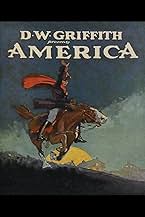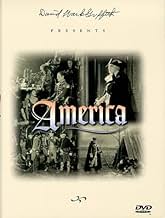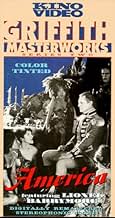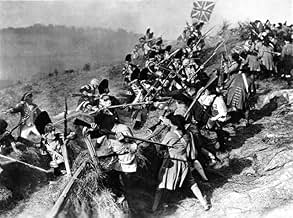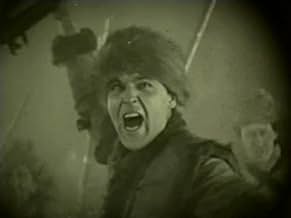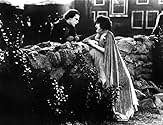Ajouter une intrigue dans votre langueThe story of a family caught up in the American Revolutionary War.The story of a family caught up in the American Revolutionary War.The story of a family caught up in the American Revolutionary War.
- Récompenses
- 1 victoire au total
Lucille La Verne
- A Refugee Mother
- (as Lucile La Verne)
Paul Doucet
- Marquis de Lafayette
- (as H. Paul Doucet)
Histoire
Le saviez-vous
- AnecdotesThis film is regarded as a major turning point in the career of D.W. Griffith. Its critical and public failure ended Griffith's tenure as the industry's preeminent director.
- GaffesPaul Revere falls off his horse. For some reason, Griffith has Revere ride up the steps of people's homes to announce "The British are coming!" as if he has to shout this at their doors. Backing down one set of stairs, Revere's horse falls, tossing the actor, who quickly recovers and shows considerable concern for the horse's welfare. Griffith left in the spill.
- Citations
Nathan Holden: Love may come and love may go, and sigh like the wind from tree to tree. But I shall love no more, no more, till this fair maid come back to me.
- ConnexionsEdited into The Negro Soldier (1944)
Commentaire à la une
America (1924)
*** (out of 4)
This film is basically a remake of The Birth of a Nation but this time the story is set during the American Revolutionary War. We have George Washington (Arthur Dewey) trying to make our country free while Capt. Walter Butler (Lionel Barrymore) tries to get the Indians on his side to attack what one hopes to become the new America. In the mean time, two young lovers (Neil Hamilton, Carol Dempster) are split apart due to them fighting on opposite sides of the war. This film was a notorious flop when originally released and everything Griffith made after this was basically done so that he could clean up debts gathered by this film. Time has certainly been kinder to the film than movie crowds in 1924 because this is a pretty strong take on the war that features a nice story, great battle scenes and some fine performances. Barrymore steals the show with his crazed performance but he never goes over the top but even without words you can see the passion on his face as he fights for what he believes is right. Hamilton and Dempster are both fine in their roles, although I'm sure stronger actors would have been better. The majority of the film deals with the actual story of the war and not the battle scenes. Griffith handles all the quiet moments very well but there's no question that the battle scenes are where the energy is at. Hundreds of extras were used and again, like previous Griffith epics, the battle scenes look incredibly realistic as if Griffith were there filming while the real battles were taking place. The story of the families being split apart probably would have worked better had it not been so familiar as to the story in The Birth of a Nation but either way this was Griffith's last epic and while it's not the masterpiece of The Birth of a Nation or Intolerance, it's still impressive film-making.
*** (out of 4)
This film is basically a remake of The Birth of a Nation but this time the story is set during the American Revolutionary War. We have George Washington (Arthur Dewey) trying to make our country free while Capt. Walter Butler (Lionel Barrymore) tries to get the Indians on his side to attack what one hopes to become the new America. In the mean time, two young lovers (Neil Hamilton, Carol Dempster) are split apart due to them fighting on opposite sides of the war. This film was a notorious flop when originally released and everything Griffith made after this was basically done so that he could clean up debts gathered by this film. Time has certainly been kinder to the film than movie crowds in 1924 because this is a pretty strong take on the war that features a nice story, great battle scenes and some fine performances. Barrymore steals the show with his crazed performance but he never goes over the top but even without words you can see the passion on his face as he fights for what he believes is right. Hamilton and Dempster are both fine in their roles, although I'm sure stronger actors would have been better. The majority of the film deals with the actual story of the war and not the battle scenes. Griffith handles all the quiet moments very well but there's no question that the battle scenes are where the energy is at. Hundreds of extras were used and again, like previous Griffith epics, the battle scenes look incredibly realistic as if Griffith were there filming while the real battles were taking place. The story of the families being split apart probably would have worked better had it not been so familiar as to the story in The Birth of a Nation but either way this was Griffith's last epic and while it's not the masterpiece of The Birth of a Nation or Intolerance, it's still impressive film-making.
- Michael_Elliott
- 24 févr. 2008
- Permalien
Meilleurs choix
Connectez-vous pour évaluer et suivre la liste de favoris afin de recevoir des recommandations personnalisées
Détails
- Durée2 heures 21 minutes
- Mixage
- Rapport de forme
- 1.33 : 1
Contribuer à cette page
Suggérer une modification ou ajouter du contenu manquant

Lacune principale
By what name was Pour l'indépendance (1924) officially released in Canada in English?
Répondre
